Case Study: Counter-Terrorism, Human Rights & Democracy in the UK
VerifiedAdded on 2020/01/21
|7
|2603
|135
Case Study
AI Summary
This case study examines the complexities of counter-terrorism in the UK, focusing on the balance between national security and the protection of human rights. It explores the definition of terrorism, the justification for robust counter-terrorism measures, and the potential impact on civil liberties, particularly for Muslim communities. The analysis delves into specific counter-terrorism powers, including pre-charge detention under the Terrorism Act 2000 and stop-and-search provisions, evaluating their effectiveness and their compatibility with human rights obligations. The case study also considers the implications of the freedom of expression and the challenges posed by radicalization, particularly in the wake of events in France and Belgium. The study highlights the need for counter-terrorism policies to be precise, accessible, and non-discriminatory, while ensuring that the police's actions are legitimate and proportionate. The study concludes by emphasizing the importance of protecting democracy and the way of life of the people.

NAME:
REGISTRATION NUMBER:
COURSE TITLE:
REGISTRATION NUMBER:
COURSE TITLE:
Paraphrase This Document
Need a fresh take? Get an instant paraphrase of this document with our AI Paraphraser
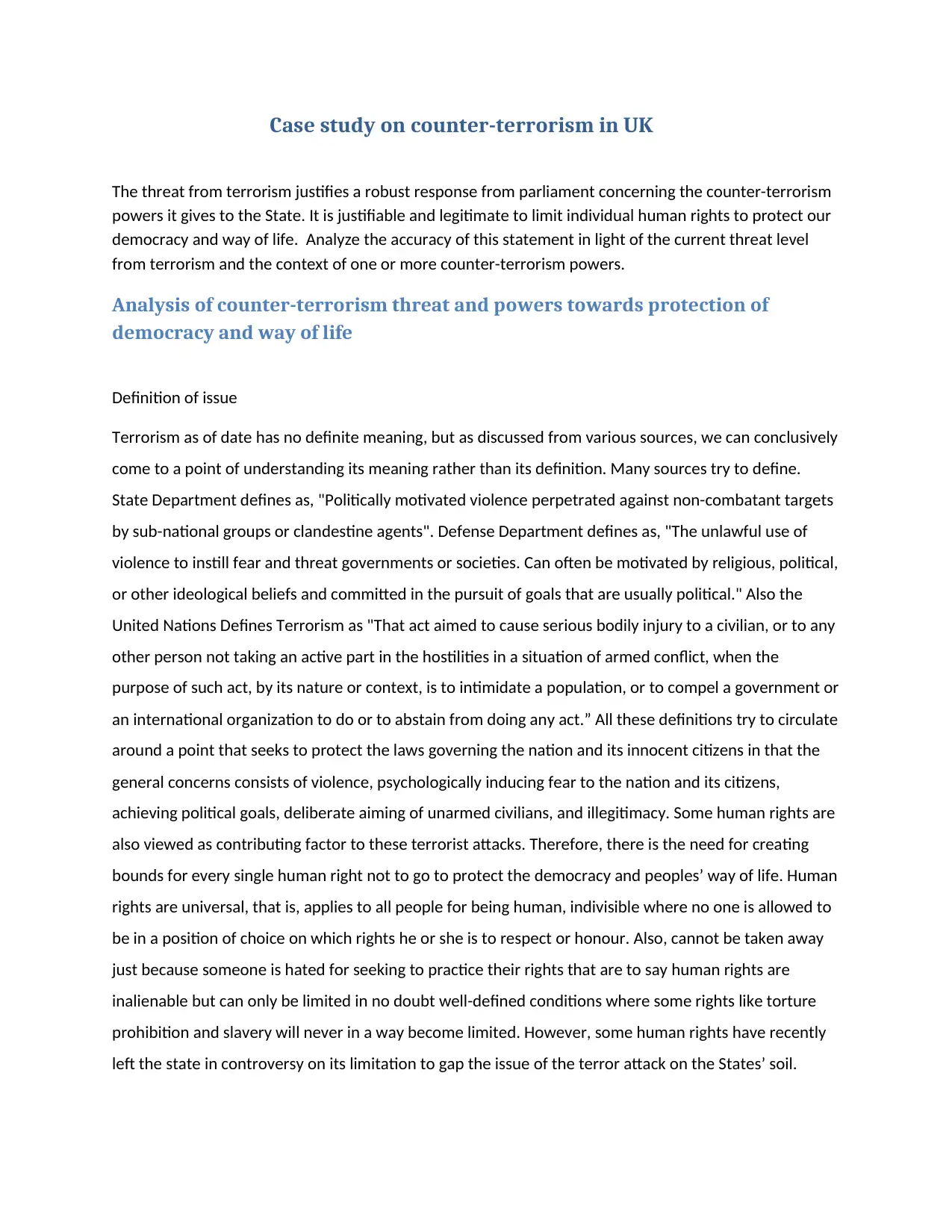
Case study on counter-terrorism in UK
The threat from terrorism justifies a robust response from parliament concerning the counter-terrorism
powers it gives to the State. It is justifiable and legitimate to limit individual human rights to protect our
democracy and way of life. Analyze the accuracy of this statement in light of the current threat level
from terrorism and the context of one or more counter-terrorism powers.
Analysis of counter-terrorism threat and powers towards protection of
democracy and way of life
Definition of issue
Terrorism as of date has no definite meaning, but as discussed from various sources, we can conclusively
come to a point of understanding its meaning rather than its definition. Many sources try to define.
State Department defines as, "Politically motivated violence perpetrated against non-combatant targets
by sub-national groups or clandestine agents". Defense Department defines as, "The unlawful use of
violence to instill fear and threat governments or societies. Can often be motivated by religious, political,
or other ideological beliefs and committed in the pursuit of goals that are usually political." Also the
United Nations Defines Terrorism as "That act aimed to cause serious bodily injury to a civilian, or to any
other person not taking an active part in the hostilities in a situation of armed conflict, when the
purpose of such act, by its nature or context, is to intimidate a population, or to compel a government or
an international organization to do or to abstain from doing any act.” All these definitions try to circulate
around a point that seeks to protect the laws governing the nation and its innocent citizens in that the
general concerns consists of violence, psychologically inducing fear to the nation and its citizens,
achieving political goals, deliberate aiming of unarmed civilians, and illegitimacy. Some human rights are
also viewed as contributing factor to these terrorist attacks. Therefore, there is the need for creating
bounds for every single human right not to go to protect the democracy and peoples’ way of life. Human
rights are universal, that is, applies to all people for being human, indivisible where no one is allowed to
be in a position of choice on which rights he or she is to respect or honour. Also, cannot be taken away
just because someone is hated for seeking to practice their rights that are to say human rights are
inalienable but can only be limited in no doubt well-defined conditions where some rights like torture
prohibition and slavery will never in a way become limited. However, some human rights have recently
left the state in controversy on its limitation to gap the issue of the terror attack on the States’ soil.
The threat from terrorism justifies a robust response from parliament concerning the counter-terrorism
powers it gives to the State. It is justifiable and legitimate to limit individual human rights to protect our
democracy and way of life. Analyze the accuracy of this statement in light of the current threat level
from terrorism and the context of one or more counter-terrorism powers.
Analysis of counter-terrorism threat and powers towards protection of
democracy and way of life
Definition of issue
Terrorism as of date has no definite meaning, but as discussed from various sources, we can conclusively
come to a point of understanding its meaning rather than its definition. Many sources try to define.
State Department defines as, "Politically motivated violence perpetrated against non-combatant targets
by sub-national groups or clandestine agents". Defense Department defines as, "The unlawful use of
violence to instill fear and threat governments or societies. Can often be motivated by religious, political,
or other ideological beliefs and committed in the pursuit of goals that are usually political." Also the
United Nations Defines Terrorism as "That act aimed to cause serious bodily injury to a civilian, or to any
other person not taking an active part in the hostilities in a situation of armed conflict, when the
purpose of such act, by its nature or context, is to intimidate a population, or to compel a government or
an international organization to do or to abstain from doing any act.” All these definitions try to circulate
around a point that seeks to protect the laws governing the nation and its innocent citizens in that the
general concerns consists of violence, psychologically inducing fear to the nation and its citizens,
achieving political goals, deliberate aiming of unarmed civilians, and illegitimacy. Some human rights are
also viewed as contributing factor to these terrorist attacks. Therefore, there is the need for creating
bounds for every single human right not to go to protect the democracy and peoples’ way of life. Human
rights are universal, that is, applies to all people for being human, indivisible where no one is allowed to
be in a position of choice on which rights he or she is to respect or honour. Also, cannot be taken away
just because someone is hated for seeking to practice their rights that are to say human rights are
inalienable but can only be limited in no doubt well-defined conditions where some rights like torture
prohibition and slavery will never in a way become limited. However, some human rights have recently
left the state in controversy on its limitation to gap the issue of the terror attack on the States’ soil.
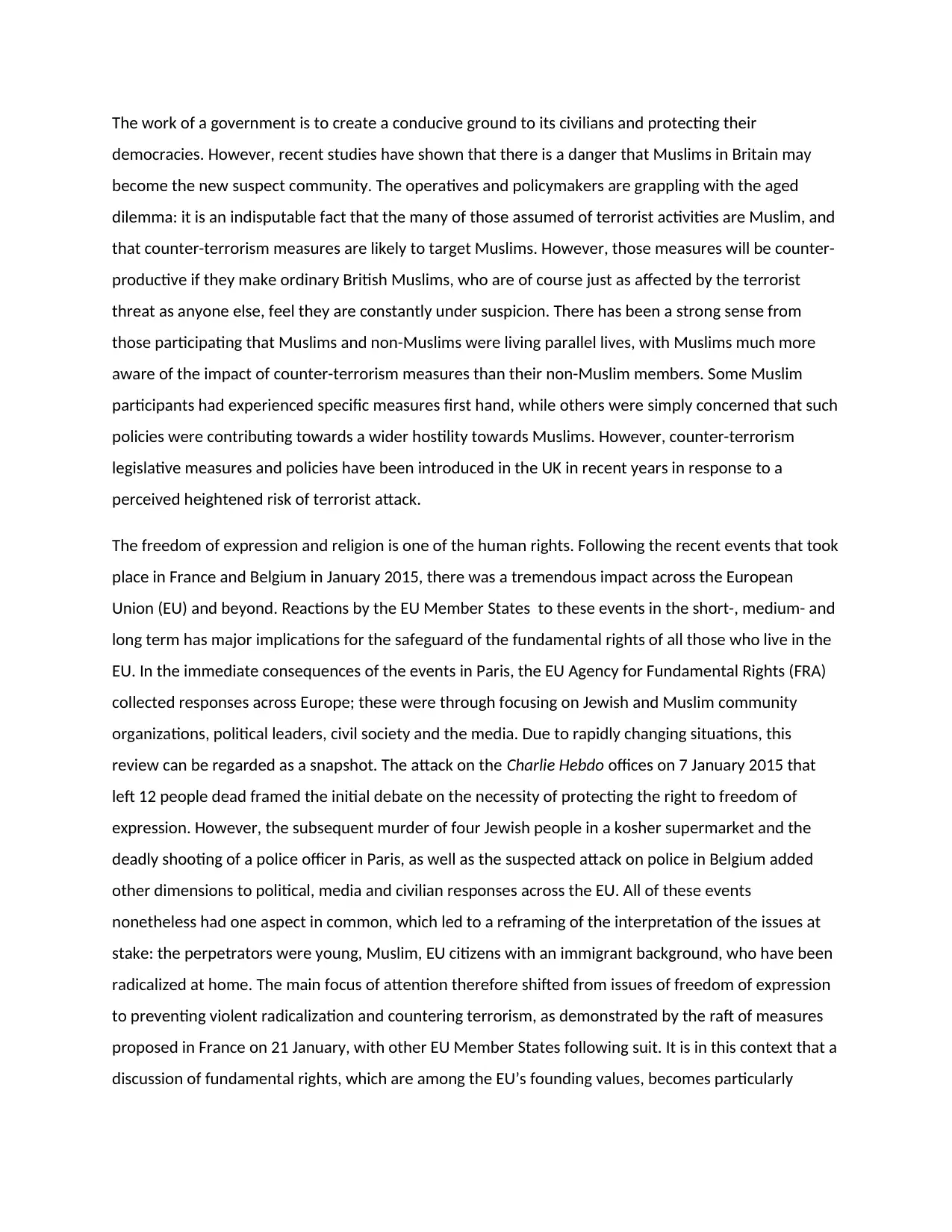
The work of a government is to create a conducive ground to its civilians and protecting their
democracies. However, recent studies have shown that there is a danger that Muslims in Britain may
become the new suspect community. The operatives and policymakers are grappling with the aged
dilemma: it is an indisputable fact that the many of those assumed of terrorist activities are Muslim, and
that counter-terrorism measures are likely to target Muslims. However, those measures will be counter-
productive if they make ordinary British Muslims, who are of course just as affected by the terrorist
threat as anyone else, feel they are constantly under suspicion. There has been a strong sense from
those participating that Muslims and non-Muslims were living parallel lives, with Muslims much more
aware of the impact of counter-terrorism measures than their non-Muslim members. Some Muslim
participants had experienced specific measures first hand, while others were simply concerned that such
policies were contributing towards a wider hostility towards Muslims. However, counter-terrorism
legislative measures and policies have been introduced in the UK in recent years in response to a
perceived heightened risk of terrorist attack.
The freedom of expression and religion is one of the human rights. Following the recent events that took
place in France and Belgium in January 2015, there was a tremendous impact across the European
Union (EU) and beyond. Reactions by the EU Member States to these events in the short-, medium- and
long term has major implications for the safeguard of the fundamental rights of all those who live in the
EU. In the immediate consequences of the events in Paris, the EU Agency for Fundamental Rights (FRA)
collected responses across Europe; these were through focusing on Jewish and Muslim community
organizations, political leaders, civil society and the media. Due to rapidly changing situations, this
review can be regarded as a snapshot. The attack on the Charlie Hebdo offices on 7 January 2015 that
left 12 people dead framed the initial debate on the necessity of protecting the right to freedom of
expression. However, the subsequent murder of four Jewish people in a kosher supermarket and the
deadly shooting of a police officer in Paris, as well as the suspected attack on police in Belgium added
other dimensions to political, media and civilian responses across the EU. All of these events
nonetheless had one aspect in common, which led to a reframing of the interpretation of the issues at
stake: the perpetrators were young, Muslim, EU citizens with an immigrant background, who have been
radicalized at home. The main focus of attention therefore shifted from issues of freedom of expression
to preventing violent radicalization and countering terrorism, as demonstrated by the raft of measures
proposed in France on 21 January, with other EU Member States following suit. It is in this context that a
discussion of fundamental rights, which are among the EU’s founding values, becomes particularly
democracies. However, recent studies have shown that there is a danger that Muslims in Britain may
become the new suspect community. The operatives and policymakers are grappling with the aged
dilemma: it is an indisputable fact that the many of those assumed of terrorist activities are Muslim, and
that counter-terrorism measures are likely to target Muslims. However, those measures will be counter-
productive if they make ordinary British Muslims, who are of course just as affected by the terrorist
threat as anyone else, feel they are constantly under suspicion. There has been a strong sense from
those participating that Muslims and non-Muslims were living parallel lives, with Muslims much more
aware of the impact of counter-terrorism measures than their non-Muslim members. Some Muslim
participants had experienced specific measures first hand, while others were simply concerned that such
policies were contributing towards a wider hostility towards Muslims. However, counter-terrorism
legislative measures and policies have been introduced in the UK in recent years in response to a
perceived heightened risk of terrorist attack.
The freedom of expression and religion is one of the human rights. Following the recent events that took
place in France and Belgium in January 2015, there was a tremendous impact across the European
Union (EU) and beyond. Reactions by the EU Member States to these events in the short-, medium- and
long term has major implications for the safeguard of the fundamental rights of all those who live in the
EU. In the immediate consequences of the events in Paris, the EU Agency for Fundamental Rights (FRA)
collected responses across Europe; these were through focusing on Jewish and Muslim community
organizations, political leaders, civil society and the media. Due to rapidly changing situations, this
review can be regarded as a snapshot. The attack on the Charlie Hebdo offices on 7 January 2015 that
left 12 people dead framed the initial debate on the necessity of protecting the right to freedom of
expression. However, the subsequent murder of four Jewish people in a kosher supermarket and the
deadly shooting of a police officer in Paris, as well as the suspected attack on police in Belgium added
other dimensions to political, media and civilian responses across the EU. All of these events
nonetheless had one aspect in common, which led to a reframing of the interpretation of the issues at
stake: the perpetrators were young, Muslim, EU citizens with an immigrant background, who have been
radicalized at home. The main focus of attention therefore shifted from issues of freedom of expression
to preventing violent radicalization and countering terrorism, as demonstrated by the raft of measures
proposed in France on 21 January, with other EU Member States following suit. It is in this context that a
discussion of fundamental rights, which are among the EU’s founding values, becomes particularly
⊘ This is a preview!⊘
Do you want full access?
Subscribe today to unlock all pages.

Trusted by 1+ million students worldwide
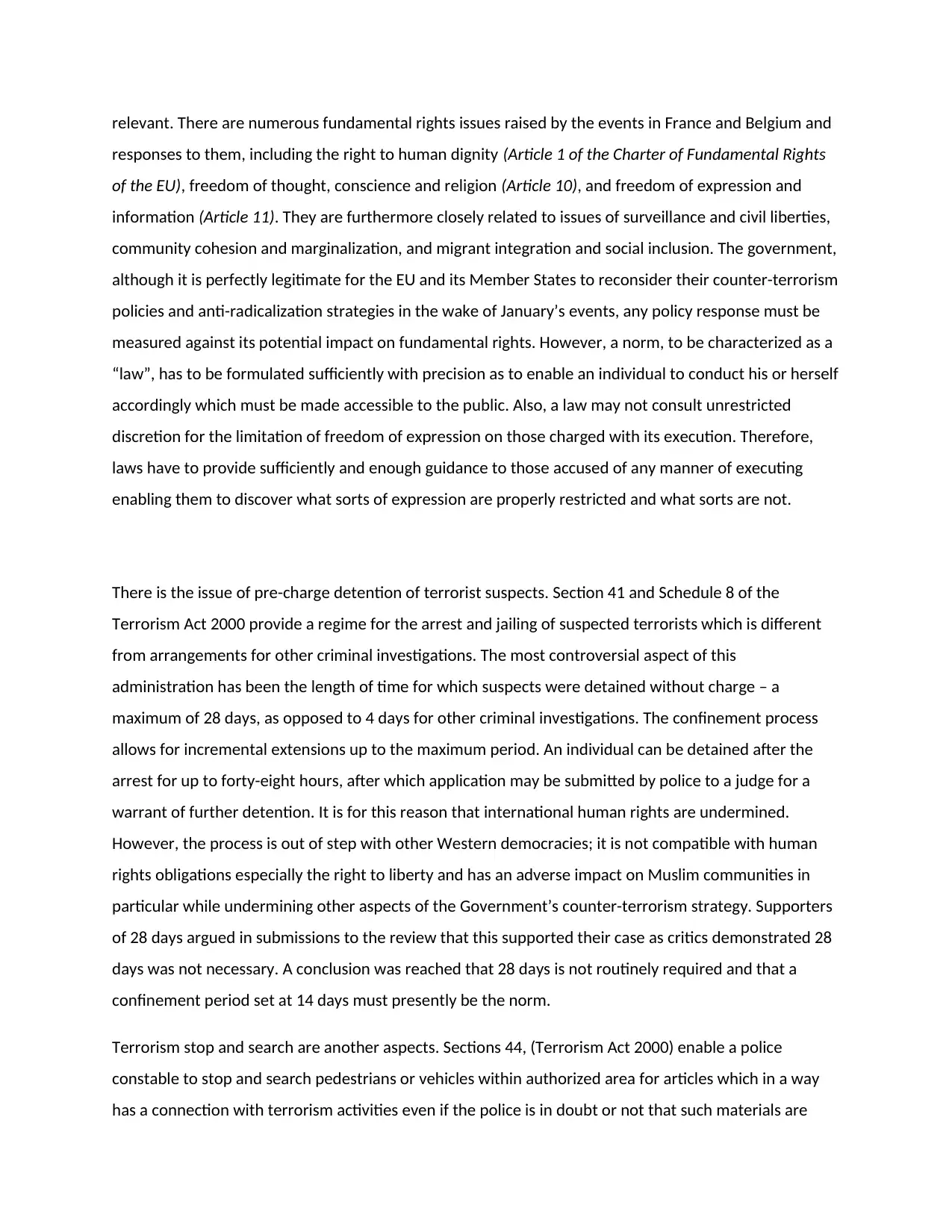
relevant. There are numerous fundamental rights issues raised by the events in France and Belgium and
responses to them, including the right to human dignity (Article 1 of the Charter of Fundamental Rights
of the EU), freedom of thought, conscience and religion (Article 10), and freedom of expression and
information (Article 11). They are furthermore closely related to issues of surveillance and civil liberties,
community cohesion and marginalization, and migrant integration and social inclusion. The government,
although it is perfectly legitimate for the EU and its Member States to reconsider their counter-terrorism
policies and anti-radicalization strategies in the wake of January’s events, any policy response must be
measured against its potential impact on fundamental rights. However, a norm, to be characterized as a
“law”, has to be formulated sufficiently with precision as to enable an individual to conduct his or herself
accordingly which must be made accessible to the public. Also, a law may not consult unrestricted
discretion for the limitation of freedom of expression on those charged with its execution. Therefore,
laws have to provide sufficiently and enough guidance to those accused of any manner of executing
enabling them to discover what sorts of expression are properly restricted and what sorts are not.
There is the issue of pre-charge detention of terrorist suspects. Section 41 and Schedule 8 of the
Terrorism Act 2000 provide a regime for the arrest and jailing of suspected terrorists which is different
from arrangements for other criminal investigations. The most controversial aspect of this
administration has been the length of time for which suspects were detained without charge – a
maximum of 28 days, as opposed to 4 days for other criminal investigations. The confinement process
allows for incremental extensions up to the maximum period. An individual can be detained after the
arrest for up to forty-eight hours, after which application may be submitted by police to a judge for a
warrant of further detention. It is for this reason that international human rights are undermined.
However, the process is out of step with other Western democracies; it is not compatible with human
rights obligations especially the right to liberty and has an adverse impact on Muslim communities in
particular while undermining other aspects of the Government’s counter-terrorism strategy. Supporters
of 28 days argued in submissions to the review that this supported their case as critics demonstrated 28
days was not necessary. A conclusion was reached that 28 days is not routinely required and that a
confinement period set at 14 days must presently be the norm.
Terrorism stop and search are another aspects. Sections 44, (Terrorism Act 2000) enable a police
constable to stop and search pedestrians or vehicles within authorized area for articles which in a way
has a connection with terrorism activities even if the police is in doubt or not that such materials are
responses to them, including the right to human dignity (Article 1 of the Charter of Fundamental Rights
of the EU), freedom of thought, conscience and religion (Article 10), and freedom of expression and
information (Article 11). They are furthermore closely related to issues of surveillance and civil liberties,
community cohesion and marginalization, and migrant integration and social inclusion. The government,
although it is perfectly legitimate for the EU and its Member States to reconsider their counter-terrorism
policies and anti-radicalization strategies in the wake of January’s events, any policy response must be
measured against its potential impact on fundamental rights. However, a norm, to be characterized as a
“law”, has to be formulated sufficiently with precision as to enable an individual to conduct his or herself
accordingly which must be made accessible to the public. Also, a law may not consult unrestricted
discretion for the limitation of freedom of expression on those charged with its execution. Therefore,
laws have to provide sufficiently and enough guidance to those accused of any manner of executing
enabling them to discover what sorts of expression are properly restricted and what sorts are not.
There is the issue of pre-charge detention of terrorist suspects. Section 41 and Schedule 8 of the
Terrorism Act 2000 provide a regime for the arrest and jailing of suspected terrorists which is different
from arrangements for other criminal investigations. The most controversial aspect of this
administration has been the length of time for which suspects were detained without charge – a
maximum of 28 days, as opposed to 4 days for other criminal investigations. The confinement process
allows for incremental extensions up to the maximum period. An individual can be detained after the
arrest for up to forty-eight hours, after which application may be submitted by police to a judge for a
warrant of further detention. It is for this reason that international human rights are undermined.
However, the process is out of step with other Western democracies; it is not compatible with human
rights obligations especially the right to liberty and has an adverse impact on Muslim communities in
particular while undermining other aspects of the Government’s counter-terrorism strategy. Supporters
of 28 days argued in submissions to the review that this supported their case as critics demonstrated 28
days was not necessary. A conclusion was reached that 28 days is not routinely required and that a
confinement period set at 14 days must presently be the norm.
Terrorism stop and search are another aspects. Sections 44, (Terrorism Act 2000) enable a police
constable to stop and search pedestrians or vehicles within authorized area for articles which in a way
has a connection with terrorism activities even if the police is in doubt or not that such materials are
Paraphrase This Document
Need a fresh take? Get an instant paraphrase of this document with our AI Paraphraser
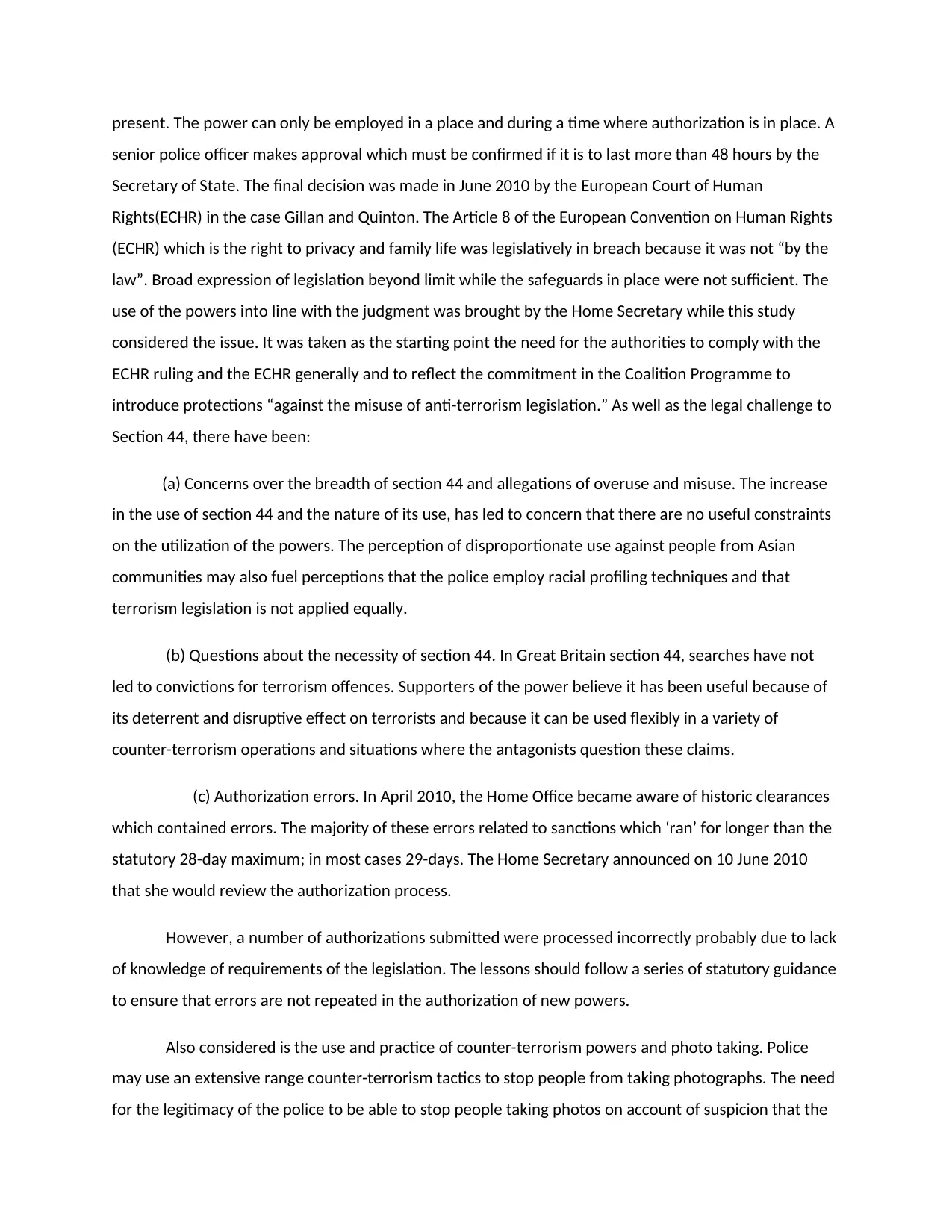
present. The power can only be employed in a place and during a time where authorization is in place. A
senior police officer makes approval which must be confirmed if it is to last more than 48 hours by the
Secretary of State. The final decision was made in June 2010 by the European Court of Human
Rights(ECHR) in the case Gillan and Quinton. The Article 8 of the European Convention on Human Rights
(ECHR) which is the right to privacy and family life was legislatively in breach because it was not “by the
law”. Broad expression of legislation beyond limit while the safeguards in place were not sufficient. The
use of the powers into line with the judgment was brought by the Home Secretary while this study
considered the issue. It was taken as the starting point the need for the authorities to comply with the
ECHR ruling and the ECHR generally and to reflect the commitment in the Coalition Programme to
introduce protections “against the misuse of anti-terrorism legislation.” As well as the legal challenge to
Section 44, there have been:
(a) Concerns over the breadth of section 44 and allegations of overuse and misuse. The increase
in the use of section 44 and the nature of its use, has led to concern that there are no useful constraints
on the utilization of the powers. The perception of disproportionate use against people from Asian
communities may also fuel perceptions that the police employ racial profiling techniques and that
terrorism legislation is not applied equally.
(b) Questions about the necessity of section 44. In Great Britain section 44, searches have not
led to convictions for terrorism offences. Supporters of the power believe it has been useful because of
its deterrent and disruptive effect on terrorists and because it can be used flexibly in a variety of
counter-terrorism operations and situations where the antagonists question these claims.
(c) Authorization errors. In April 2010, the Home Office became aware of historic clearances
which contained errors. The majority of these errors related to sanctions which ‘ran’ for longer than the
statutory 28-day maximum; in most cases 29-days. The Home Secretary announced on 10 June 2010
that she would review the authorization process.
However, a number of authorizations submitted were processed incorrectly probably due to lack
of knowledge of requirements of the legislation. The lessons should follow a series of statutory guidance
to ensure that errors are not repeated in the authorization of new powers.
Also considered is the use and practice of counter-terrorism powers and photo taking. Police
may use an extensive range counter-terrorism tactics to stop people from taking photographs. The need
for the legitimacy of the police to be able to stop people taking photos on account of suspicion that the
senior police officer makes approval which must be confirmed if it is to last more than 48 hours by the
Secretary of State. The final decision was made in June 2010 by the European Court of Human
Rights(ECHR) in the case Gillan and Quinton. The Article 8 of the European Convention on Human Rights
(ECHR) which is the right to privacy and family life was legislatively in breach because it was not “by the
law”. Broad expression of legislation beyond limit while the safeguards in place were not sufficient. The
use of the powers into line with the judgment was brought by the Home Secretary while this study
considered the issue. It was taken as the starting point the need for the authorities to comply with the
ECHR ruling and the ECHR generally and to reflect the commitment in the Coalition Programme to
introduce protections “against the misuse of anti-terrorism legislation.” As well as the legal challenge to
Section 44, there have been:
(a) Concerns over the breadth of section 44 and allegations of overuse and misuse. The increase
in the use of section 44 and the nature of its use, has led to concern that there are no useful constraints
on the utilization of the powers. The perception of disproportionate use against people from Asian
communities may also fuel perceptions that the police employ racial profiling techniques and that
terrorism legislation is not applied equally.
(b) Questions about the necessity of section 44. In Great Britain section 44, searches have not
led to convictions for terrorism offences. Supporters of the power believe it has been useful because of
its deterrent and disruptive effect on terrorists and because it can be used flexibly in a variety of
counter-terrorism operations and situations where the antagonists question these claims.
(c) Authorization errors. In April 2010, the Home Office became aware of historic clearances
which contained errors. The majority of these errors related to sanctions which ‘ran’ for longer than the
statutory 28-day maximum; in most cases 29-days. The Home Secretary announced on 10 June 2010
that she would review the authorization process.
However, a number of authorizations submitted were processed incorrectly probably due to lack
of knowledge of requirements of the legislation. The lessons should follow a series of statutory guidance
to ensure that errors are not repeated in the authorization of new powers.
Also considered is the use and practice of counter-terrorism powers and photo taking. Police
may use an extensive range counter-terrorism tactics to stop people from taking photographs. The need
for the legitimacy of the police to be able to stop people taking photos on account of suspicion that the
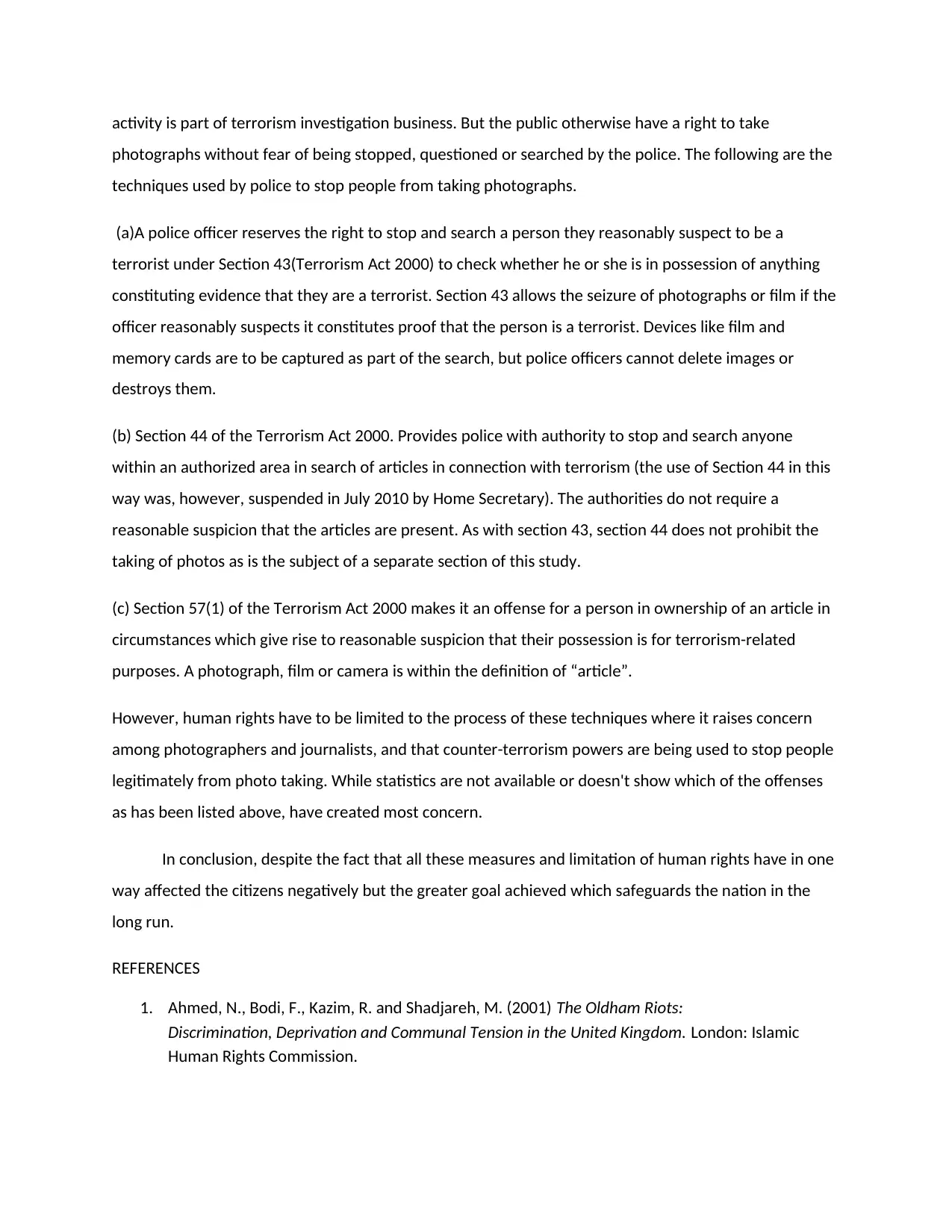
activity is part of terrorism investigation business. But the public otherwise have a right to take
photographs without fear of being stopped, questioned or searched by the police. The following are the
techniques used by police to stop people from taking photographs.
(a)A police officer reserves the right to stop and search a person they reasonably suspect to be a
terrorist under Section 43(Terrorism Act 2000) to check whether he or she is in possession of anything
constituting evidence that they are a terrorist. Section 43 allows the seizure of photographs or film if the
officer reasonably suspects it constitutes proof that the person is a terrorist. Devices like film and
memory cards are to be captured as part of the search, but police officers cannot delete images or
destroys them.
(b) Section 44 of the Terrorism Act 2000. Provides police with authority to stop and search anyone
within an authorized area in search of articles in connection with terrorism (the use of Section 44 in this
way was, however, suspended in July 2010 by Home Secretary). The authorities do not require a
reasonable suspicion that the articles are present. As with section 43, section 44 does not prohibit the
taking of photos as is the subject of a separate section of this study.
(c) Section 57(1) of the Terrorism Act 2000 makes it an offense for a person in ownership of an article in
circumstances which give rise to reasonable suspicion that their possession is for terrorism-related
purposes. A photograph, film or camera is within the definition of “article”.
However, human rights have to be limited to the process of these techniques where it raises concern
among photographers and journalists, and that counter-terrorism powers are being used to stop people
legitimately from photo taking. While statistics are not available or doesn't show which of the offenses
as has been listed above, have created most concern.
In conclusion, despite the fact that all these measures and limitation of human rights have in one
way affected the citizens negatively but the greater goal achieved which safeguards the nation in the
long run.
REFERENCES
1. Ahmed, N., Bodi, F., Kazim, R. and Shadjareh, M. (2001) The Oldham Riots:
Discrimination, Deprivation and Communal Tension in the United Kingdom. London: Islamic
Human Rights Commission.
photographs without fear of being stopped, questioned or searched by the police. The following are the
techniques used by police to stop people from taking photographs.
(a)A police officer reserves the right to stop and search a person they reasonably suspect to be a
terrorist under Section 43(Terrorism Act 2000) to check whether he or she is in possession of anything
constituting evidence that they are a terrorist. Section 43 allows the seizure of photographs or film if the
officer reasonably suspects it constitutes proof that the person is a terrorist. Devices like film and
memory cards are to be captured as part of the search, but police officers cannot delete images or
destroys them.
(b) Section 44 of the Terrorism Act 2000. Provides police with authority to stop and search anyone
within an authorized area in search of articles in connection with terrorism (the use of Section 44 in this
way was, however, suspended in July 2010 by Home Secretary). The authorities do not require a
reasonable suspicion that the articles are present. As with section 43, section 44 does not prohibit the
taking of photos as is the subject of a separate section of this study.
(c) Section 57(1) of the Terrorism Act 2000 makes it an offense for a person in ownership of an article in
circumstances which give rise to reasonable suspicion that their possession is for terrorism-related
purposes. A photograph, film or camera is within the definition of “article”.
However, human rights have to be limited to the process of these techniques where it raises concern
among photographers and journalists, and that counter-terrorism powers are being used to stop people
legitimately from photo taking. While statistics are not available or doesn't show which of the offenses
as has been listed above, have created most concern.
In conclusion, despite the fact that all these measures and limitation of human rights have in one
way affected the citizens negatively but the greater goal achieved which safeguards the nation in the
long run.
REFERENCES
1. Ahmed, N., Bodi, F., Kazim, R. and Shadjareh, M. (2001) The Oldham Riots:
Discrimination, Deprivation and Communal Tension in the United Kingdom. London: Islamic
Human Rights Commission.
⊘ This is a preview!⊘
Do you want full access?
Subscribe today to unlock all pages.

Trusted by 1+ million students worldwide
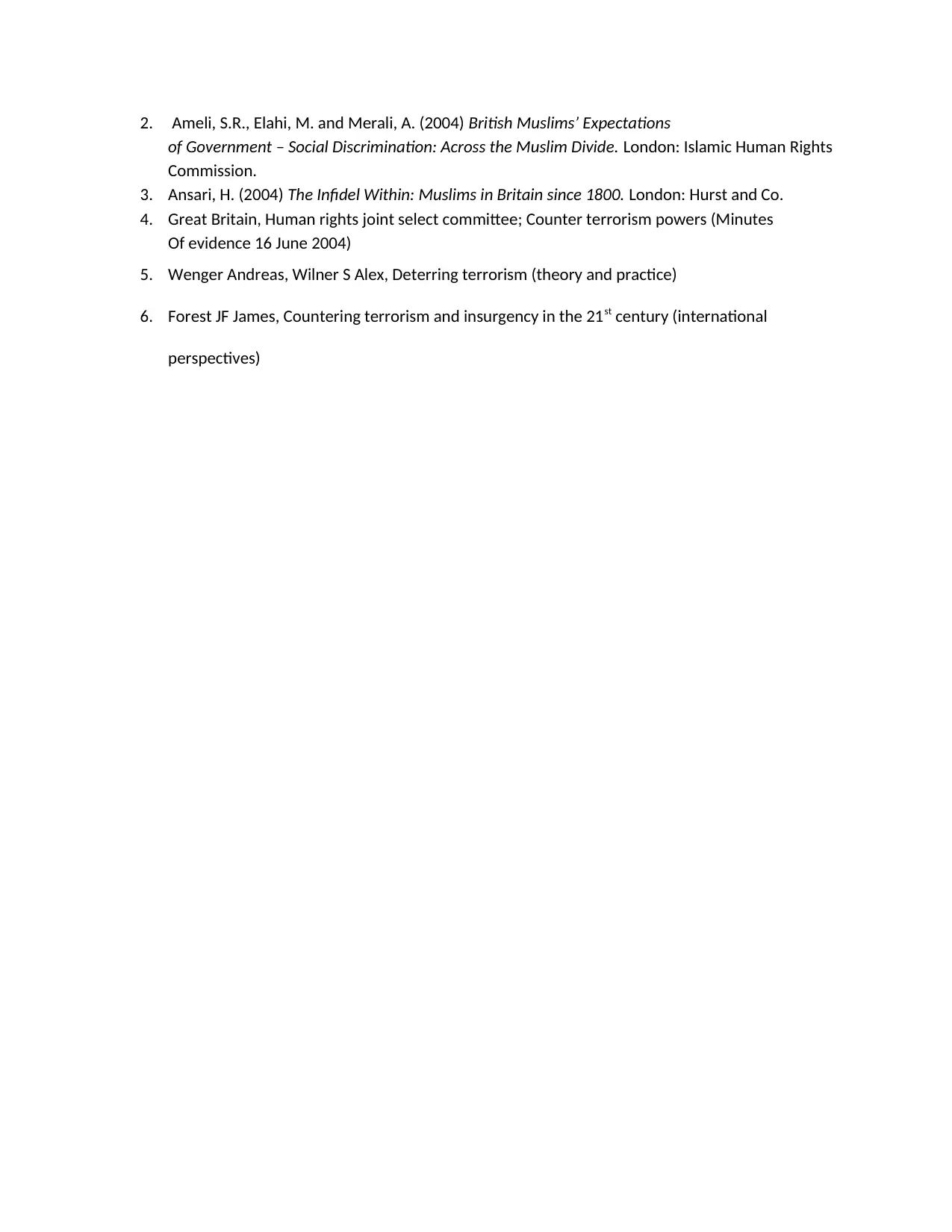
2. Ameli, S.R., Elahi, M. and Merali, A. (2004) British Muslims’ Expectations
of Government – Social Discrimination: Across the Muslim Divide. London: Islamic Human Rights
Commission.
3. Ansari, H. (2004) The Infidel Within: Muslims in Britain since 1800. London: Hurst and Co.
4. Great Britain, Human rights joint select committee; Counter terrorism powers (Minutes
Of evidence 16 June 2004)
5. Wenger Andreas, Wilner S Alex, Deterring terrorism (theory and practice)
6. Forest JF James, Countering terrorism and insurgency in the 21st century (international
perspectives)
of Government – Social Discrimination: Across the Muslim Divide. London: Islamic Human Rights
Commission.
3. Ansari, H. (2004) The Infidel Within: Muslims in Britain since 1800. London: Hurst and Co.
4. Great Britain, Human rights joint select committee; Counter terrorism powers (Minutes
Of evidence 16 June 2004)
5. Wenger Andreas, Wilner S Alex, Deterring terrorism (theory and practice)
6. Forest JF James, Countering terrorism and insurgency in the 21st century (international
perspectives)
1 out of 7
Related Documents
Your All-in-One AI-Powered Toolkit for Academic Success.
+13062052269
info@desklib.com
Available 24*7 on WhatsApp / Email
![[object Object]](/_next/static/media/star-bottom.7253800d.svg)
Unlock your academic potential
Copyright © 2020–2026 A2Z Services. All Rights Reserved. Developed and managed by ZUCOL.





